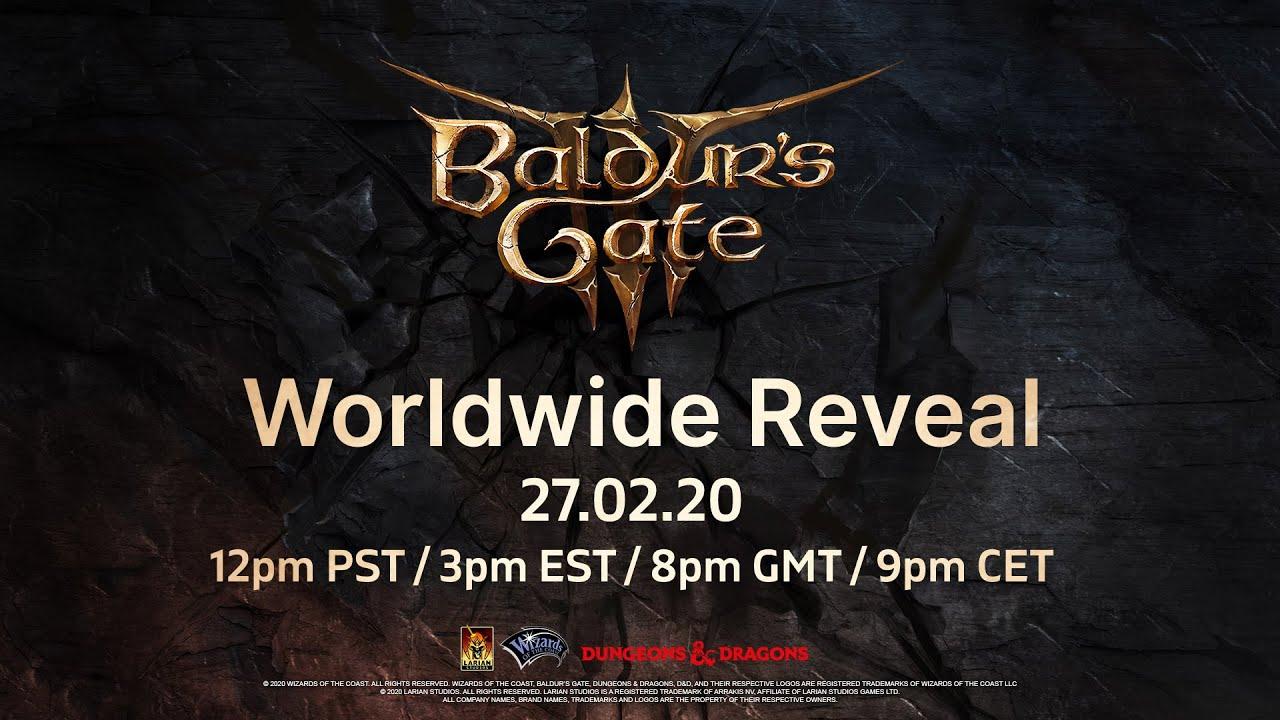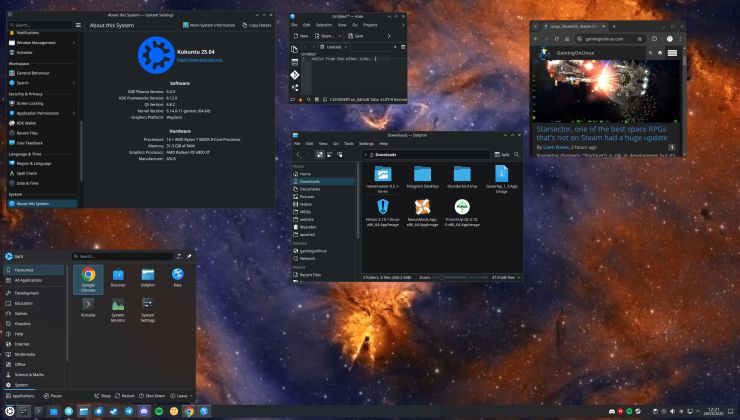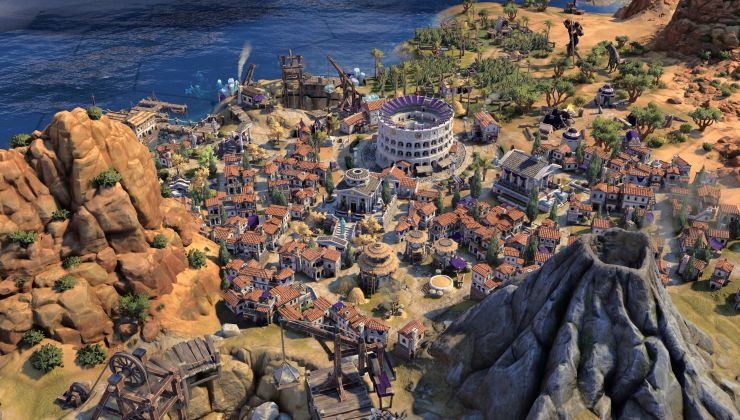Stadia, Google's Linux-powered game streaming service continues to grow with more games. Let's start this week off with a roundup and some behind the scenes info.
Firstly, Stadia now has more games live on the service as across the weekend SteamWorld Dig 2 and SteamWorld Quest launched and both are available for anyone with Stadia Pro. In addition, SteamWorld Dig and SteamWorld Heist will be launching on Stadia on March 10th.
Croteam's Serious Sam Collection also now has a release date of March 3rd, which Google did a small interview for with the Chief Creative Officer Davor Hunski on the Stadia community.
If you somehow missed it, Baldur's Gate 3 which is coming to Stadia also had a gameplay reveal that you can see in the below video:

Direct Link
As far as we know, it's not coming to the Linux desktop officially but it will be on Steam. Not a surprise though, since it's Larian Studios who took a long time to get Divinity: Original Sin on Linux with the Enhanced Edition but then never gave us the second one.
When it comes to porting games to Stadia, I did speak to Image & Form Games (SteamWorld). It was expected by some, that having a Linux desktop build would make it easier to port to Stadia since Stadia is Debian Linux and the Vulkan API. However, turns out it doesn't help as much as you might think. They said:
All in all, we didn't save too much time from having a Linux build, most of the system work is dependent on the platform. For example, achievements, save data handling, input handling, etc is specific for the Stadia platform and it doesn't really matter too much which OS is running in the background. The biggest single chunk of work was porting the game to Vulkan, which took a bit over a month. We also spent some time to fine-tune and tweak the games to have minimal input delay and to run as smoothly as possible.
So there you have it. Interesting to know at least.
Google did say they were getting around 120 games on Stadia this year, and it seems more are slowly now starting to trickle in. On that subject, not all developers are impressed with what Google had to offer them. In an article on Business Insider, they cite multiple unnamed developers mentioning there was barely any financial incentive offered and some also mentioned how Google has a habit of killing projects. So clearly Stadia still has a lot to prove.
Google better make some Linux Distro and games for it!
Which leads us to this:
https://www.gamingonlinux.com/articles/steam-reportedly-coming-to-chrome-os-linux-gaming-across-even-more-devices.15796
Any news on the subject?
All in all, we didn't save too much time from having a Linux build, most of the system work is dependent on the platform. For example, achievements, save data handling, input handling, etc is specific for the Stadia platform and it doesn't really matter too much which OS is running in the background. The biggest single chunk of work was porting the game to Vulkan, which took a bit over a month.
No one is going to call bullshit on that?
Achievements, save data handling, possibly even input handling (Steam does some of this I believe), etc, aren't OS specific anyway. From steam to gog to itch to any console these are all different.
The biggest chunk of work was on Vulkan and they did that. The rest is superficial.
Just another excuse from Larian not to support Linux.
I was super excited for Baldur's Gate 3 and was going to pick it up on Stadia, but their garbage excuses have really taken the hype away for me personally.
The game went from an absolute buy for me to unlikely, just because I don't want to support their bullshit excuses.
Last edited by ozoned on 2 Mar 2020 at 3:27 pm UTC
As mentioned, that quote was from Image & Form, not Larian.All in all, we didn't save too much time from having a Linux build, most of the system work is dependent on the platform. For example, achievements, save data handling, input handling, etc is specific for the Stadia platform and it doesn't really matter too much which OS is running in the background. The biggest single chunk of work was porting the game to Vulkan, which took a bit over a month.Just another excuse from Larian not to support Linux.
As mentioned, that quote was from Image & Form, not Larian.
Well color me embarrassed.
Your absolutely right and I apologize to Larian then.
The Steamworld games aren't Vulkan on Steam right? Wonder if that would have made the port faster.
Guess I'll have to pick up Baldurs Gate 3 then. 😂
I seriously missed that point. Thank you for correcting me Liam!
As far as we know, it's not coming to the Linux desktop officially but it will be on Steam.
They never said it's not coming, they so far didn't comment on their future plans.
See here: http://forums.larian.com/ubbthreads.php?ubb=showflat&Number=652719
And to everyone here. Please actually head to that thread, and express your interest in the game for desktop Linux! So far very few people did it.
The biggest single chunk of work was porting the game to Vulkan, which took a bit over a month
That's the main point. Input and etc. may be Stadia specific, but it's minor stuff in comparison with the renderer work. Icculus stressed this several times in the past.
Which means that once the game is released for Stadia, it's not hard to release it for Linux proper.
Last edited by Shmerl on 2 Mar 2020 at 4:55 pm UTC
there even is a steamworld dig 2 nintendo 3ds port... why would anyone stream it?This type of question was asked before, same answer for any platform: they need all types of games, for all types of gamers. It's really simple. Just because a game works elsewhere, doesn't mean a newer platform doesn't want/need it.
All in all, we didn't save too much time from having a Linux build, most of the system work is dependent on the platform. For example, achievements, save data handling, input handling, etc is specific for the Stadia platform and it doesn't really matter too much which OS is running in the background. The biggest single chunk of work was porting the game to Vulkan, which took a bit over a month.
No one is going to call bullshit on that?
Achievements, save data handling, possibly even input handling (Steam does some of this I believe), etc, aren't OS specific anyway. From steam to gog to itch to any console these are all different.
The biggest chunk of work was on Vulkan and they did that. The rest is superficial.
Just another excuse from Larian not to support Linux.
I was super excited for Baldur's Gate 3 and was going to pick it up on Stadia, but their garbage excuses have really taken the hype away for me personally.
The game went from an absolute buy for me to unlikely, just because I don't want to support their bullshit excuses.
i agree, that is just bullshit.
porting the code to vulkan is by fair the hardest part, after that, the rest of porting efforts is much cheaper, aside from the Q/A on different distros.
there even is a steamworld dig 2 nintendo 3ds port... why would anyone stream it?This type of question was asked before, same answer for any platform: they need all types of games, for all types of gamers. It's really simple. Just because a game works elsewhere, doesn't mean a newer platform doesn't want/need it.
google only needs it, so they can say.... "look we have more games now"... maybe they gave them money to port it
who would buy a game with a few 100MB to stream it? i also said this under another article... streaming sucks a few 100MB per minute
every new phone could handle it easily and i can keep my game. if staida goes down, your games are gone too
Last edited by Shmerl on 3 Mar 2020 at 6:58 pm UTC
In an article on Business Insider, they cite multiple unnamed developers mentioning there was barely any financial incentive offered and some also mentioned how Google has a habit of killing projects. So clearly Stadia still has a lot to prove.
Quote from the Business Insider article:
It's a statement we heard echoed by several prominent indie developers and two publishing executives we spoke with for this piece.
The article at Business Insider is pure clickbait!
What does "several" mean? It means that there was more than 1 developer. More than 1 can also be 2. Without absolute numbers or names this is no representative statement! What are 2, 3 or maybe 10 indie developers if there are hundreds and thousands of them out there? And what are "two" Publishing Executives when there are certainly hundreds of them?
The headline attracts you ... and in the article there are half-baked statements which are pushed to the general statement. Clickbait!
Here also a youtuber has brought the whole thing well to the point:
https://www.youtube.com/watch?v=FJnKdm6BKWA
I still don't get it, why Google can increase their list of potentially supported games by integrating their SDK with Wine as a fallback until they get more native Linux Vulkan games. They must have some reason why they didn't do it.
because having an version for linux, is not enough.
they need to run the game with an acceptable input lag, and they cant do that with wine.
plus, wine give then no Q/A, if you see the list of games that run on protondb, you will see a lot of false positives (games that lack some features such as cutscenes, but still were classified as platinum) compare that list with valve's white list, valve list is quite smaller.
another thing to consider is that google already tried to support wine in the past, looks like they came to the conclusion that it was not worth it.
valve could have tried this from the beggining, but its an bad option, looks like they are trying it as an last ressource since their plan A failed (steam machines).
google on the other hand, tried supporting wine, tried NaCl, tried supporting standards like vulkan, webGL, webGL2, web assembly, and now as an last atempt: streaming.
if wine was an solution, they wouldnt have to stream anything.
to make an game stream-able, you need an better performance than native, since the game will suffer from input-lag you have to compensate it somehow, meaning, if you were directly at the servers you would get an better performance than native, but since you arent you get the delay from sending the input and receiving the output.
that said, running games on wine is not an option, neither for Q/A that all the features will be there, nor from input lag point of view, nor from the cost of streaming (both sending the data over the wire and having the compute power to process millions of players anyway)
In an article on Business Insider, they cite multiple unnamed developers mentioning there was barely any financial incentive offered and some also mentioned how Google has a habit of killing projects. So clearly Stadia still has a lot to prove.
Quote from the Business Insider article:
It's a statement we heard echoed by several prominent indie developers and two publishing executives we spoke with for this piece.
The article at Business Insider is pure clickbait!
What does "several" mean? It means that there was more than 1 developer. More than 1 can also be 2. Without absolute numbers or names this is no representative statement! What are 2, 3 or maybe 10 indie developers if there are hundreds and thousands of them out there? And what are "two" Publishing Executives when there are certainly hundreds of them?
The headline attracts you ... and in the article there are half-baked statements which are pushed to the general statement. Clickbait!
Here also a youtuber has brought the whole thing well to the point:
https://www.youtube.com/watch?v=FJnKdm6BKWA
i agree, there are millions of indie developers, and a dozen of triple A developers.
what would google do?
throw millions of dollars each indie developer?
or, throw millions of dollars at a few dozen triple a developers, and a fez hundreds at a few indie ones?
of course they would say there is not much incentive, unless they have an exclusivity deal, their opinion dont count.
another thing to consider is that google already tried to support wine in the past, looks like they came to the conclusion that it was not worth it.
When was it exactly and do you have some sources about how it failed?
if wine was an solution, they wouldnt have to stream anything.
Streaming vs local is completely orthogonal to Wine vs native. You can have all combinations.
Last edited by Shmerl on 3 Mar 2020 at 7:00 pm UTC
another thing to consider is that google already tried to support wine in the past, looks like they came to the conclusion that it was not worth it.
When was it exactly and do you have some sources about how it failed?
if wine was an solution, they wouldnt have to stream anything.
Streaming vs local is completely orthogonal to Wine vs native. You can have all combinations.
i cant remember if it was that, or something else:
https://arstechnica.com/information-technology/2008/02/google-intoxicates-linux-users-with-wine-improvements/
but i heard google was helping years ago, and since then, never heard it again.
as for it failed, well, valve is the one doing proton and stuff, while google gave up on this strategy to focus on streaming...
google tried to support wine, webGL, webgl2, web assembly, and while those had an moderate sucess, gaming and many professional softwares are still windows exclusives, so instead of investing in solutions like wine to make more games run on chromeOS or try to expand the chromeOS marketshare litle by little, they are trying to sell the idea that on the cloud, developers can sell games to up to 2 billions of persons (wich is much easier to sell than chromeOS that has an little market that didnt move too much and the seling point of then is the low price.
it seems to be easier to make the games run on cloud then stream then to chromebooks to sell more chromeOS devices than make then run on chromeOS while try to get marketshare for it at the same time...










 How to set, change and reset your SteamOS / Steam Deck desktop sudo password
How to set, change and reset your SteamOS / Steam Deck desktop sudo password How to set up Decky Loader on Steam Deck / SteamOS for easy plugins
How to set up Decky Loader on Steam Deck / SteamOS for easy plugins
See more from me